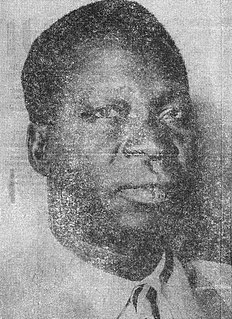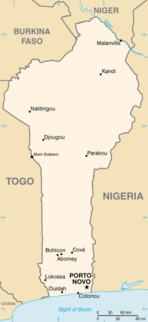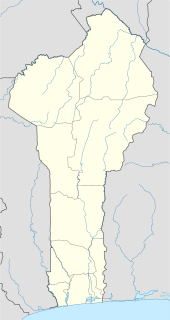The Republic of Benin was formed in 1960 when the colony of French Dahomey gained independence from France. Prior to this, the area that is now the Republic of Benin was divided largely between two coastal kingdoms, Dahomey and Porto-Novo, and a large area of various tribes in the north. The French assembled these various groups together into the colony of French Dahomey, which was part of the various colonies of French West Africa from 1904 until 1960. In the independence era, the republic was extremely unstable for the first decade and a half of existence, with multiple governments and multiple military coups. In 1972, Mathieu Kérékou led a military coup deposing the Presidential Council and appointing himself as the head of state, a position he held until 1991 when the country returned to multiparty elections. Since that point, the state has held multiple presidential and legislative elections and a number of different parties have become important.

Sourou-Migan Marcellin Joseph Apithy was a Beninese political figure most active when his country was known as Dahomey. He arose on a political scene where one's power was dictated by what region in Dahomey one lived in.

Coutoucou Hubert Maga was a politician from Dahomey. He arose on a political scene where one's power was dictated by what region in Dahomey one lived in. Born a peasant in 1916, Maga served as a schoolmaster from 1936 to 1945, during which time he gradually gained considerable influence among the uneducated. He was elected to Dahomey's territorial assembly in 1947 and founded the Northern Ethnical Group, later renamed the Dahomey Democratic Rally. In 1951, Maga was elected to the French National Assembly, where he served in various positions, including premier from 1959 to 1960. When Dahomey gained its independence from France on August 1, 1960, Maga was appointed to the presidency, and was officially elected to that post on December 11.

Justin Ahomadegbé-Tomêtin was a Beninese politician most active when his country was known as Dahomey. He arose on a political scene where one's power was dictated by what region of Dahomey one lived in. He served as president of the National Assembly of Dahomey from April 1959 to November 1960 and as prime minister of Benin from 1964 to 1965.

Elections in Benin take place within the framework of a multi-party democracy and a presidential system. Both the President and the National Assembly are directly elected by voters, with elections organised by the Autonomous National Electoral Commission (CENA).

Colonel Paul-Émile de Souza was a Beninese army officer and political figure. He was chairman of the Directory of Dahomey from December 13, 1969 to May 7, 1970.
Édouard Dunglas (1891–1952) was a French physician, historian, geographer, and politician who spent a majority of his life in Dahomey.

Elections for the Territorial Assembly were held in French Dahomey on 30 March 1952. Sourou-Migan Apithy's Republican Party of Dahomey won 19 of the 32 second college seats. Only ten members of the Legislative Council elected in 1947 were re-elected.
Middlesex County Council was the principal local government body in the administrative county of Middlesex, England from 1889 to 1965.

The Presidential Council was a triumvirate system of government in the Republic of Dahomey from 7 May 1970 until 26 October 1972. The Presidential Council included Hubert Maga, Justin Ahomadégbé-Tomêtin, and Sourou-Migan Apithy as equal members of a council which held all legislative and executive power in the state of Dahomey.

Elections to the General Council were held in French Dahomey in December 1946 and 5 January 1947. The result was a victory for the Dahomeyan Progressive Union, which won 20 of the 30 seats.

The Dahomeyan Democratic Union was a political party in French Dahomey.

Administrative Council elections were held in Dahomey in 1928.

Administrative Council elections were held in Dahomey in 1932.

Administrative Council elections were held in Dahomey in 1934.

Administrative Council elections were held in Dahomey in 1936.

Administrative Council elections were held in Dahomey in 1930.

The 1972 Dahomeyan coup d'état was a military coup staged on 26 October 1972 by Major Mathieu Kérékou, who took control of the Republic of Dahomey and ended a system of government established following the annulled 1970 presidential election, in which three members of the Presidential Council were to rotate in power. Ahomadégbé-Tomêtin served as the Chairman at the time of the coup.











